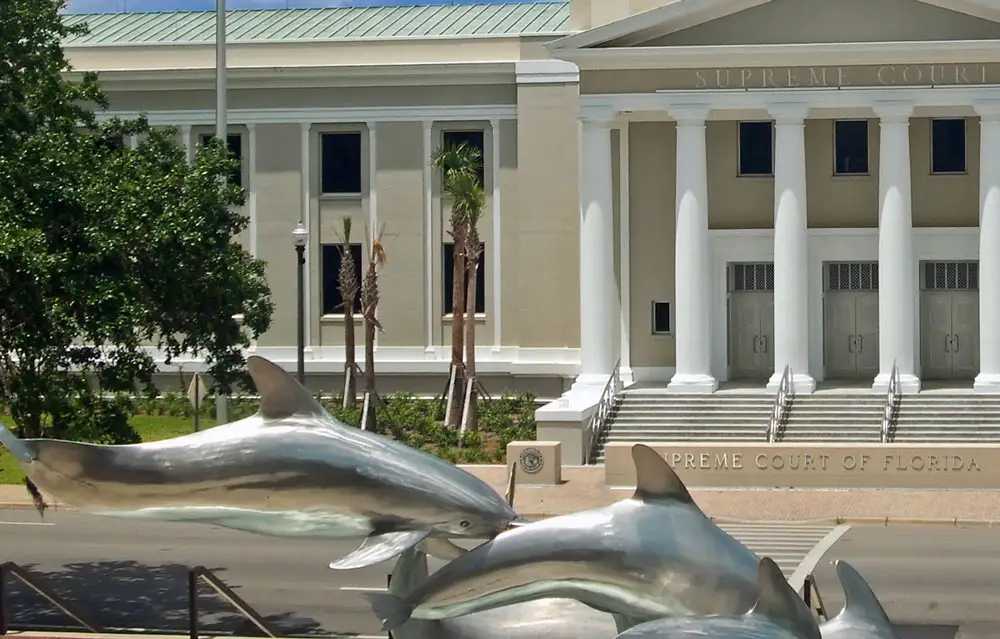
The U.S. Senate on Wednesday overwhelmingly approved Florida Supreme Court Justice Barbara Lagoa’s appointment to the 11th U.S. Circuit Court of Appeals, setting the stage for Gov. Ron DeSantis to make two appointments to the state’s highest court.
Wednesday’s 80-15 vote in favor of Lagoa’s confirmation came a day after the Senate approved the appointment of her Supreme Court bench mate, Robert Luck, to the same federal court.
President Donald Trump in September nominated Luck and Lagoa to fill vacancies on the Atlanta-based appellate court, which hears cases from Florida, Alabama and Georgia.
DeSantis appointed Luck, Lagoa and Justice Carlos Muñiz to the Florida Supreme Court shortly after the Republican governor took office in January. The appointments filled three vacancies created when justices Barbara Pariente, R. Fred Lewis and Peggy Quince were forced to step down after reaching a mandatory retirement age.
The openings provide DeSantis an opportunity to infuse some diversity onto the seven-member Supreme Court.
Following Quince’s exit in early January, the court for the first time in more than three decades has lacked a black justice. And Lagoa’s departure now leaves the court without a female justice, again for the first time in recent history.
“It’s very important for our judicial system to reflect the people who come before the courts. It is an underpinning of the trust and confidence they have in the process and the entire administration of justice, when they can identify in ways with people on the court,” Martha Barnett, a Tallahassee lawyer who is a former president of the American Bar Association and The Florida Bar, told The News Service of Florida in a telephone interview Wednesday.
This week’s Senate confirmations of Luck and Lagoa — who was the first Cuban-American woman to serve on the court — set in motion the process for the Florida Supreme Court Judicial Nominating Commission to provide a list of names for DeSantis to consider in filling the vacancies.
A year ago, the nominating commission dismayed some state court-watchers and civil rights advocates with its list of 11 finalists to replace the three retiring justices.
The list included two women: Lagoa and Jamie Rutland Grosshans, a judge on the Daytona Beach-based 5th District Court of Appeal. But none of the nine jurists and two lawyers nominated by the commission were African-American, although six of the original 59 applicants were black.
The absence of a black justice on the highest court in the nation’s third-largest state, which has more than 3.5 million African-American residents, drew sharp criticism.
“It’s not a good day for the judiciary of the state of Florida when you’re going to look up there (at the Supreme Court bench) and not see anybody who is black after 36 years,” former state Sen. Arthenia Joyner, a Tampa lawyer and longtime civil- rights leader said last November. “What message are we sending to our kids? That it’s a complete reversal of going back to the days of segregation?”
DeSantis spokeswoman Helen Ferré said Wednesday that half of the governor’s judicial appointments are women and about 40 percent “are from a diverse ethnic or racial background.”
“The most important consideration for Gov. DeSantis in considering an appointee to the courts is their firm commitment to the Constitution, the rule of law and the understanding of the limited role of the judiciary,” she said in an email.
Barnett, however, stressed the need for the nominating commission to provide options for DeSantis that reflect the state’s diversity.
The various nominating commissions, which make recommendations for judicial appointments to other courts as well as the Supreme Court, are responsible for considering “the intellect, the integrity, the experience, the temperament and the core qualifications” of the people they’re screening, Barnett said.
“But the appointing authority (the governor) has to bear in mind that he or she represents all of the people and that it’s important to have quality, qualified individuals that reflect the populations that are impacted, which means our entire state population,” she said.
The Supreme Court nominating commission will soon begin accepting applications for the two vacancies and has up to 60 days to provide a list of selections to DeSantis. The governor then has up to 60 days to make his appointments.
The commission will conduct interviews before recommending three to six finalists for each opening, Daniel Nordby, the commission’s chairman, told the News Service this week.
DeSantis recently said he expects to fill the vacancies early next year.
–Dara Kam, News Service of Florida






























JimBob says
DeSantis’ problem with diversity is in finding black or brown judges who believe in white supremacy like most of his base.
CB from PC says
Well JimBob, read about the Dixiecrat Democrat Southern Segregationists.
Joe Biden worked with Segregationists Strom Thurmond and Jesse Helms and, as he said, “we got things done”. Surely no Quid Pro Quo from Joe.. Jimmy Carter’s Lt. Governor closed his Atlanta restaurant rather than serve Blacks.
Freedom for African Americans in the USA began with Republican President Abraham Lincoln.
The current economy is giving everyone economic freedom with a paycheck instead of a welfare handout